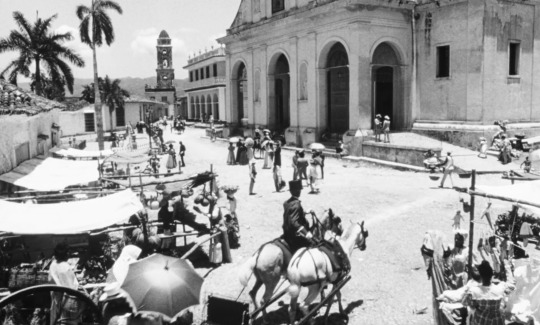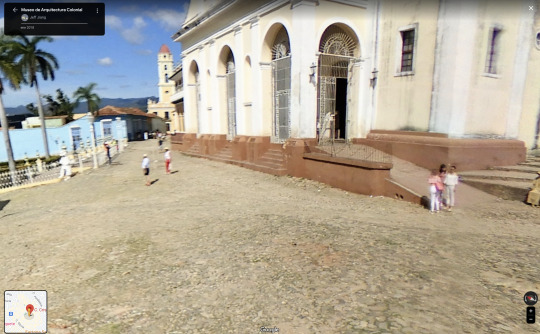#humberto solás
Explore tagged Tumblr posts
Text



Lucía / Lucia Humberto Solás. 1968
Church Ermita de Nuestra Señora de la Candelaria de la Popa, C. Desengaño, Trinidad, Cuba See in map
See in imdb
#humberto solás#lucia#lucía#raquel revuelta#trinidad#cuba#ruins#church#movie#cinema#film#location#google maps#street view#1968
22 notes
·
View notes
Text

Humberto Solás, December 4, 1941 – September 18, 2008.
3 notes
·
View notes
Text

Lucia (Humberto Solás, 1968)
5 notes
·
View notes
Text
Los oros chilenos en los Panamericanos

Los atletas de Chile han logrado 13 medallas de oro -además de 12 de plata y 20 de bronce- en el historial de los Juegos Deportivos Panamericanos, surgidos en 1951 en Buenos Aires. En aquella primera edición, triunfaron Betty Kretschmer en salto en largo, Hernán Figueroa en el decathlon y María Eliena Gaete en los 80 metros con vallas, atleta que iba a repetir su triunfo cuatro años después en México, cuando también su compatriota Guillermo Solá obtuvo los 3.000 metros con obstáculos (allí los chilenos concretaron el 1-2 ya que Santiago Nova fue subcampeón). En 1959 (Chicago) la gran Marlene Ahrens se conasgró campeona de jabalina con 45.38 m., cuando ya estaba considerada una de las mejores especialistas del mundo tras obtener la medalla de plata olímpica en Melbourne 56. Ahrens retuvo su cetro panamericano en Sao Paulo 1963 con 49.43 m. Pasarían veinte años hasta que otro chileno llegara hasta el primer lugar del podio, en este caso Emilio Ulloa en los 3.000 metros con obstáculos al ganar en Caracas con 8:57.62. Las temporadas siguientes marcaron el gran momento del lanzador de bala Gert Weil, también finalista olímpico y mundial, quien logró los títulos panamericanos en Indianápolis 1987 (20.21 m.) y La Habana 1991 (19.47 m.), subiendo también al podio en Caracas 1983 (subcampeón) y en Mar del Plata 1995 (bronce). Ahora Martina Weil, hija del matrimonio entre Gert y la notable atleta colombiana Ximena Restrepo (vicepresidenta de World Athletics), integrará la Selección de Chile e irá en busca del podio de los 400 llanos, especialidad en la que viene de consagrarse campeona sudamericana en Sao Paulo. En Winnipeg 1999, Erika Olivera conquistó el maratón femenino con 2:37:41. El siguiente título correspondió a Daniel Pineda en Guadalajara 2011 con 7.97 m. en salto en largo. Y el último de la serie chilena fue logrado en Lima 2019 por Gabriel Kehr en lanzamiento del martillo con 74.98 m. Kehr -quien también viene de ser finalista en el Mundial de Budapest- y el campeón sudamericano Humberto Fernando Mansilla, surgidos de la gran escuela de lanzadores de Temuco, llevarán ahora las esperanzas chilenas por un nuevo lauro en esta disciplina. Read the full article
0 notes
Text
May 30, 2023: National Allegory vs. Women
Humberto Solás’ Lucía (1968) posits three women, all named Lucía, as allegory for Cuba and Cuba’s journey from colonized territory to communist nation. Each Lucía represents a different political era of Cuba and their narratives mirror that of the struggles that Cuba was going through at that time. The final Lucía is in the 1960s, and is a reflection of Solás’ feelings towards Fidel Castro’s communist Cuba. It centers around Lucía, who is in an unhappy and abusive relationship. She leaves the relationship, but finds herself more miserable alone. The episode ends with Lucía returning to the relationship, supposedly happy and realizing what she had been missing.
National allegory as melodrama is slightly contradictory in its nature because while personified national symbols tend to be feminine (i.e. Lady Liberty), hence lending a tie between national allegory and melodrama, the narrative of national allegory in film goes against that of melodrama. National allegory typically celebrates the victories of a nation and tells a story of overcoming struggles to provide a better future. Metaphorically, the woman who would be in place of the nation still plays out a circular narrative of melodrama, but the nation itself is part of a traditional linear narrative.
In Lucía, the final Lucía ends her episode and the film back in her previously abusive relationship, still fighting. It is played like the fighting they do is natural and simply part of being in a relationship, but is Lucía truly happy? She has played out the circular narrative of melodrama, but the ending is happy, is it not? The ending provides two readings that the audience can choose, either one that the director intended (the happy ending) or one that admits what is explicitly happening (Lucía has reentered and must stay in her previously abusive relationship). The ending does not show them explicitly reconciling, only being together in the state they were at the beginning of the episode.
Metaphor and allegory typically is not a one-to-one reading. But having contradictory endings for the symbol and what is being represented provides confusion and makes murky the true, intended meaning of the text.
1 note
·
View note
Photo







Lucia 1968, Humberto Solás
10 notes
·
View notes
Photo


Eslinda Nuñez in “Amada” (Nelson Rodríguez, Humberto Solás, 1983)
3 notes
·
View notes
Link

Alongside Mikhail Kalatozov’s I Am Cuba (1964), Humberto Solás’ Lucía (1968) was one of the formative texts of the new Cuban cinema established in the wake of Fidel Castro’s 1959 Cuban Revolution. Where Kalatozov’s film was a Mosfilm Soviet co-production, Lucía stands as a distinctly Cuban document which, mimicking Kalatozov’s anthology format, and has little regard for the larger international class struggle, limiting its scope to the last hundred years of Cuban history as told through the experiences of three different women all named Lucía who live through three different moments of political upheaval. The first section set in the 1895 Cuban war of independence sees a wealthy aristocrat played by Raquel Revuelta fall in love with a dashing, seemingly apolitical stranger who in fact works as a spy for the Spanish government. After seducing her, he tricks her into revealing the location of her brother—a rebel guerrilla—at a coffee plantation where the rest of the Cuban nationalists are hiding, resulting in a massacre perpetuated by Spanish cavalry. The second section, set during the 1933 overthrowing of Cuban dictator Gerardo Machado, sees a similarly aristocratic Lucía (played by Eslinda Nunez) fleeing her pampered life to shack up with a revolutionary named Aldo. But when the two discover that the new US-backed regime of Carlos Quesada is just as decadent and corrupt, they attempt one last act of revolutionary violence before being crushed under the heel of Western imperialism. The last third takes place in an unspecified time in the 60s and follows a third Lucía played by Adela Legra who gets married to a cruel chauvinist who plucks her from her life as a field worker, locks her inside their house, and refuses to let her leave. Through the efforts and encouragement of local revolutionaries who meet with her to teach her to read as part of Castro’s Cuban Literacy Campaign, she flees her husband and rejoins her proletariat sisters, only to stumble at the last moment and return to him, suggesting a perpetual cycle of abuse and abandonment.
To read the rest of this review, click on the link!
Published on TheYoungFolks.com
#Lucía#1968#Cuban Cinema#Film Reviews#TheYoungFolks.com#TheYoungFolks#The Young Folks#Humberto Solás#Eslinda Nunez#★★★★½
2 notes
·
View notes
Text
La Habana, capital del cine latinoamericano
#FelizMartes #Cuba La Habana, capital del cine latinoamericano
Tomado de Cubasi. cu Desde el pasado ocho diciembre la vida cultural habanera vuelve a centrarse, como cada último mes del año, en el séptimo arte con las intensas jornadas del Festival Internacional del Nuevo Cine Latinoamericano, ya en su trigésimo novena edición.
Más de 400 películas serán proyectadas en cines de la capital hasta el 17 de diciembre, incluidas las que optan, esta vez, por…
View On WordPress
#39 Festival Internacional del Nuevo Cine Latinoamericano#Arturo Arango#cuba#Humberto Solás#James Ivory#Juan Antonio García Borrero#La Habana
0 notes
Text



Lucía / Lucia Humberto Solás. 1968
Square C. Cristo, Trinidad 62600, Cuba See in map
See in imdb
#humberto solás#lucía#lucia#1968#raquel revuelta#trinidad#cuba#square#fan#movie#cinema#film#location#google maps#street view
8 notes
·
View notes
Text

Humberto Solás, December 4, 1941 – September 18, 2008.
Poster for Lucía (1968) by Raúl Martínez.
5 notes
·
View notes
Text
Ledesma presentó su Reporte Integrado
#Jujuy #Empresariales #Agroindustria | #Ledesma presentó su Reporte Integrado
En un acto encabezado por su gerente general, Javier Goñi, Ledesma presentó en Jujuy su Reporte Integrado 2022, que abarca el ejercicio económico de la compañía desde el 1 de junio de 2021 al 31 de mayo de 2022. El acto contó con la participación de directivos de Ledesma, funcionarios de la provincia de Jujuy e invitados especiales. El Reporte Integrado unifica en un solo documento la Memoria y…

View On WordPress
#caña de azúcar#Carlos Haquim#Carlos Stanic#Chacra Experimental Santa Rosa#Eduardo Nougués#ejercicio económico#Exequiel Lello Ivacevich#Ezequiel Escobar#fibra de la caña#Fundación ProYungas#Global Reporting Initiative#GRI#Humberto Solá#Informe de Sostenibilidad#Javier Goñi#Jujuy#Ledesma#Ledesma Dialoga#Marcos Uribelarrea#María Inés Zigarán#Naciones Unidas#Negocio Papel#Objetivos de Desarrollo Sostenible#ODS#Openix#Pablo Gudiño#Reporte Integrado#Reporte Integrado 2022#Sociedad Rural de Jujuy#Unión Cañeros Independientes de Salta y Jujuy
0 notes
Text
Watching Humberto solás’s Lucía and it’s way more frenetic than I was expecting… goes from peaceful scene of Spanish society women in Cuba being racist to like full blown zulawski vibes
16 notes
·
View notes
Text



Lucía (1968) - Humberto Solás
¡Aquí va a haber jodienda!
#Humberto solas#lucía#lucia#cuba#adela legra#eslinda nuñez#raquel revuelta#film#film still#women in film#angry women
14 notes
·
View notes
Text
Homenaje a Tomás Piard
Homenaje a Tomás Piard
Por Joaquín Borges-Triana
A fines del pasado marzo falleció en La Habana Tomás Piard, uno de los cineastas cubanos de mayor singularidad y que llegó a convertirse en una de las poquísimas figuras de culto que ha producido nuestra cinematografía.
Pude conocerlo y conversar con él una que otra vez, gracias a nuestra amiga común Valia Valdés, actriz que participó en varias de las películas dirigidas…
View On WordPress
#Aarón Yelín#Humberto Solás#Irene López Kuchilán#Jorge Luis Sánchez#Mario Piedra#Mario Rodríguez Alemán
0 notes
Photo







Mis Favoritas de Octubre’20:
1 Mezon do Himiko (La maison de Himiko), 2005, Isshin Inudo 2 Oba Fensu (Over the Fence), 2016, Nobuhiro Yamashita 3 Lucia, 1968, Humberto Solás 4 Kare no ootobai, kanojo no shima aka His Motorbike, Her Island, 1986, Nobuhiko Obayashi 5 About Endlessness, 2019, Roy Andersson 6 The Assistant, 2019, Kitty Green and
Antidisturbios aka Riot Police, 2020, Rodrigo Sorogoyen (Miniserie)
Let us go in, The Fog is rising
#poll#my top month#isshin inudo#noubuhiro yamashita#humberto solás#Nobuhiko Obayashi#roy andersson#kitty green#rodrigo sorogoyen
10 notes
·
View notes